Sign up for the
TSL Newsletter
and get $50 off Final Draft 12
By Riley Webster · January 15, 2014
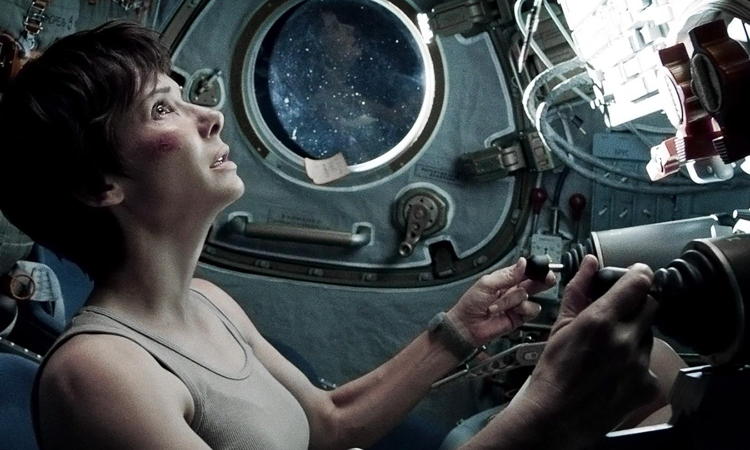

2013 was the best year for films in over a decade. I actually can't remember the last time there was this many wonderful films continually coming out — 1994, maybe, back when the world was given Shawshank Redemption, Pulp Fiction, The Lion King, and Hoop Dreams. The craziest thing is that some of the movies on this list can actually compare to those modern classics.
I loved 2013. Hollywood still, apparently, can't quite figure out to write a blockbuster script so that it has no plot-holes and isn't 2.5 hours long (cough The Lone Ranger cough). But independent cinema hasn't been this alive and fertile and creative in a long time, and even the big movie studios managed to pull off a couple impressive risks, like Gravity.
So this is my own personal list. It'll differ from yours, and that's Ok. Call me a loser for loving these films as much as I did, but you can't say I'm being dishonest. There were lots of films I wish I could've seen but was unable to, like Inside Llewyn Davis, Nebraska, The Wind Rises, Short Term 12, Saving Mr. Banks, The Hobbit 2, and Dallas Buyers Club. If there's a movie you love that's off this list, that may be the reason.
And now, for the ones that just missed the list: Ain't Them Bodies Saints, Oblivion, Upside Down, Star Trek Into Darkness, Only God Forgives, Rush, Blue Jasmine, Man of Steel, Ginger and Rosa, Down River, Fruitvale Station, The Croods, Cloudy With a Chance of Meatballs 2, Conjuring, American Hustle, As I Lay Dying, Spring Breakers, All Is Lost, This is the End, Great Gatsby, Way Way Back, Spectacular Now, Kings of Summer, Now You See Me.

Honorable Mention: Mr. Nobody
This Jared Leto-starring sci-fi drama is endlessly original, fascinating, creative, ridiculous, hilarious, inventive, thought-provoking, and flat-out awesome. But I don't know how to include it in this list, simply because of the absolute mess of its release dates. If you type it into Flixster, it says it's a 2013 movie. If you check IMDb, though, it says it's a 2009 movie. It premiered at the Toronto Film Festival in 2011, and came out in maybe 5 theatres last month, but…a week before it was supposedly coming out, I found it at a USED DVD store for 6 bucks on a Region 1 Blu-Ray. And, on top of all that, it's actual Blu-Ray release date is….next month! What a nightmare.
So I don't know if I can include it in a 2013 list, but I can tell you that whenever or wherever you find it, do yourself a favour and buy it immediately. It's a mess of a movie, but a fascinating mess, and it's almost 3 hour run-time zips right by with fantastic direction and a brilliant screenplay, showcasing how one man's life can change so completely over a simple childhood decision. Mr. Nobody deserved to be a somebody.

15. Thor: The Dark World
I can't for the life of me understand the criticism leveled at both Thor movies, which to me, are as good (or better) than anything else Marvel Studios has made, including The Avengers. Thor: The Dark World is possibly even more enjoyable than the first, and spends more time in the fantastical world of Asgard. And ultimately, that's what I appreciated most about this film — it felt more like a throw-back fantasy flick from the 80's than a modern superhero movie, and maybe because of my increasing boredom with the endless gamut of men-in-tights flicks, I dug the film more than most. Plus, Tom Hiddleston's performance as Loki is at its finest here, perfectly mixing menace with humour, and a healthy dose of affection for the audience.
As with every other major Hollywood blockbuster this year, Thor certainly could've used a re-write or two. The villian, played underneath tons of make-up by Christopher Eccleston, is rather mundane and devoid of personality, and the beautiful Natalie Portman appears completely bored and unwilling to cooperate (which, I guess, was actually the case — she didn't want to do the movie after the original female director was fired). No one said the movie is perfect, but for a crowd-pleasing, visually inventive, action-packed spectacle, I thought it fit the bill perfectly, and may just be at the top of my Marvel movies list. Sit back, turn off your brain (only slightly), and prepare for a lot of fun.
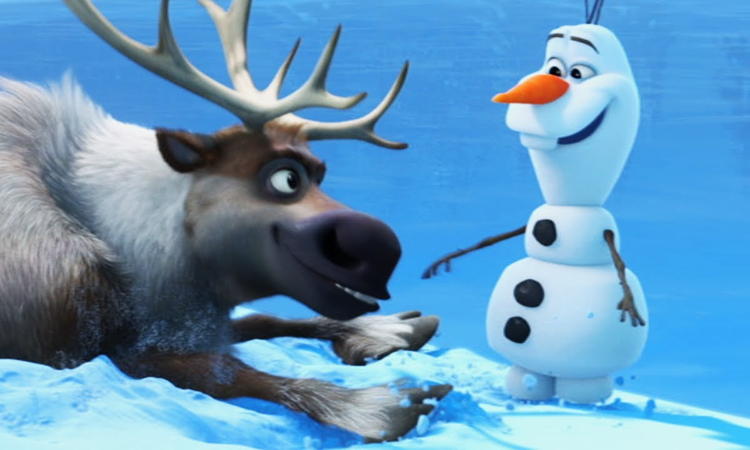
14. Frozen
Disney's best film since 1998's Mulan is a joyful romp, G-rated magic at its most innocent and delectable. Is it a perfect film? Not at all — the quest the main characters take on the mountain is tepid at best, the songs are good but not great, and the lack of a clear, distinguishable villain proves that Disney hasn't quite figured out exactly what they always did so perfectly in the early 90's. However, this is as close to a return to form as the Mouse House has gotten in over a decade; it takes what worked in their earlier Tangled and amplifies it, creating less comedy and more drama, which in turn makes it a more magical and involving experience.
The film follows two sisters, one of which has a special (never explained) power of creating snow and ice from her hands. When she flees the kingdom, her little sister tries to bring her back, with the help of a blonde ice maker and a funny snowman. The trailers make the movie appear more of a slapstick comedy than it actually is — like the best Disney films of old, Frozen remembers that it's more important to tell a dramatic, operatic story first, and THEN infuse it with comedy, rather than the other way around. I was charmed pretty much the whole way through the movie.
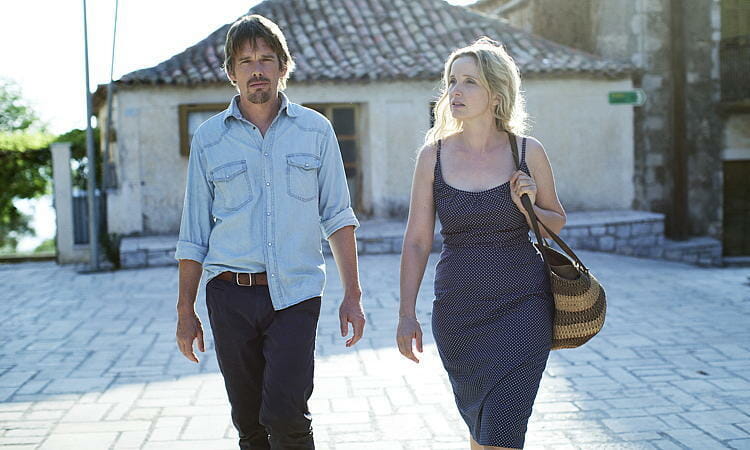
13. Before Midnight
Richard Linklater's third film in his Before trilogy is very different from the previous two, and perhaps that's what slightly disappointed me about it. Oh, it's a brilliant film, and with Ethan Hawke and Julie Delpy, we have two of the best performances of the year. But I fell in love with these characters (as they did themselves) in Before Sunrise, and again in the brilliant Before Sunset ten years later. Now, we once again return to them a decade farther in their relationship, and like most long-term romances, the couple are struggling to remain honest, open, and passionate. There are scenes here that are heartbreaking if you've been with these characters for 2 previous movies, and the last half plays like a really good Ingmar Bergman flick.
But….did I want Bergman, or did I want romantic philosophizing while the two wander a beautiful city? I guess my expectations from the previous films make this movie 13th on the list rather than any higher — what I love about the series is watching the two characters wander and talk about life, love, etc, and in this film they really only do that for 15 minutes, and the rest of the time is spent ruminating with others, and ripping each other to pieces in a hotel room. But this is all sounding more negative than I intend — the film is still, despite my reservations, among the best "third chapter's" of any film trilogy, and there are moments here that sing as high as anything in Sunrise or Sunset. Just make sure you don't care about them too much.

12. Captain Phillips
Despite not being quite as impactful as it's foreign brother, A Hijacking, Captain Phillips nevertheless continues director Paul Greengrass' winning streak for smart, tense, and riveting dramatic thrillers. In many ways, Phillips is as good as his Bourne pictures, as well as United 93 (plus it isn't nearly as depressing as the latter). Tom Hanks is terrific as Rich Phillips, the stern family man whose shipping boat is hijacked by vicious Somali pirates. The first half of the film is white-knuckle tense; the first attempt the pirates make doesn't even work, and the crew is lulled into a false sense of security, but the next day they're back, and more desperate than ever (the awards-nominated turn by former limo driver Barkhard Abdi certainly aids in the tension).
For me, the film's suspense evaporates in the last half, where Phillips is kidnapped all by himself and put in the life boat with the pirates, if for no other reason than because I now knew that no one was going to die. On the boat, any one of the 20 crew members could be shot at any second, but once there's half a movie left with only Tom Hanks on board, I felt pretty confident he was gonna last a while. But that's perhaps a small quibble, one unavoidable due to the true story behind the picture. As far as intelligent thrillers go, Captain Phillips is among the best in a long time.

11. Her
Spike Jonze is an idiosyncratic director whose films are always anticipated with great fervor — Being John Malkovich, Adaptation, and Where the Wild Things Are all showed he has a great talent, and endless creativity. Her is another solid film from him, more touching and emotionally viable than all the others, with a wonderful lead performance with Joaquin Phoenix. Movies about loners tend to overdo the social ineptitude, but Phoenix plays him perfectly as a shy man who can, and does, react well with friends and family, but…he just plain does it better with his computer operating system, who he falls in love with.
There's Oscar talk about Scarlett Johannson's portrayal as the OS named Samantha — certainly she does a great job making us feel for a computer who always remains a voice, but I think an Academy nomination would be a little over the top. Regardless, I bought into and believed this romantic relationship more than most others this year, and found myself actually rooting for them to work out. The film is too long; a fanciful sci-fi romance should never go over 2 hours, in my book, and the film does have a tendency to drag a bit. But when we're seeing this warm of characters, in this imaginative a setting, with this wonderful and hilarious of dialogue….it's hard to complain too much.

10. Elysium
Neil Blonkamp's second feature got a lot more shit-slinging than his Oscar nominated debut, District 9, but for my money Elysium is even better. For one, it doesn't buck its own genre halfway through like District did, where it was a mockumentary for 30 minutes then suddenly switched to a normal action film — and secondly, Matt Damon's main character is a protagonist that we can actually get emotionally invested with and root for, whereas Sharlto Copley in District 9 was an asshole almost to the very end. Comparisons aside, Elysium is a delightfully badass, R-rated sci-fi romp, one that wears it's blood and guts on its sleeve. It's the kind of film Arnold Schwarzenegger would've made in the 80's, and I mean that as a compliment.
The film's story is not-too-subtle in its distaste for the "upper 1%", where the rich live on a floating space station called Elysium, and the rest are all doomed to die in a post-apocalyptic Earth. Damon needs the medical healing bays up on the station, so he dons a metal exo-skeleton and tries to blast his way in there. Jodie Foster and Sharlto Copley play the villains, with varying degrees of effectiveness (Copley is brilliant, but Foster seems adrift). But for me, the real star of Elysium is Blonkamp himself — say what you will about the screenplay's plot-holes and contrivances, but you can't fault his imagination and energy. Elysium was the best action flick of the year, and a great return to hard-R science fiction.

9. A Hijacking
Captain Phillips seems to be the "pirates taking crew members hostage" thriller that everyone is praising, and while that's an excellent flick, unfortunately it means that A Hijacking is being neglected. Despite being much more slower paced, with barely a handheld camera to be found, Hijacking is actually the stronger of the two films; it's lack of star power helps in the intensity and suspense, because we never know which character is going to survive. The film also has a slightly different viewpoint than Phillips, and focuses just as much on the hostage negotiations off the boat as the victims on board; these scenes are endlessly fascinating, and frustrating.
The film is from Denmark, but don't let that scare you — about half the dialogue is in English. It doesn't ramp up everything for the expected action scenes, and in fact there's a bit of light-hearted-ness to the proceedings, or as much as can be expected when dealing with a story about a boat being hijacked by pirates. It's a subdued kind of thriller, one that doesn't thump you over the head with its intensity, but rather quietly gets under your skin, and stays there (particularly with the negotiation scenes). None of the acting is as flashy as Tom Hanks in Phillips, but it works for the quieter approach taken by the writers and directors. It's a shame this movie is getting a bit ignored now, because it's a very enveloping, intriguing flick.

8. The Retrieval and OXV: The Manual
I'm grouping these two films together, because both of them I saw at the Calgary Film Festival this year, and both are probably never going to get theatrical releases here in North America, this year or maybe even the next. Which is a crying shame, because both are wonderful, and showcase independent filmmaking at it's very finest. The Retrieval has the unfortunate problem of coming out the same year as 12 Years a Slave — they both follow a black man in the dark years of American slavery, although Retrieval shows us this from a child's perspective, and is incredibly powerful because of it. Retrieval alternates between a slavery drama, a coming-of-age tale, and an intense thriller, with the occasional bursts of action violence to liven things up. But it's the boy's relationship with Tishuan Scott, a man he's supposed to be bringing to "white justice", that gives the film it's heart.
OXV: The Manual couldn't be more different, but managed to be even more exemplary. An Australian science-fiction romance (much like Mr. Nobody and Upstream Color), OXV is about a world where people are designated into classes due to their "frequencies", or rather, the largest amount of luck and intelligence that person will be able to get for the rest of their lives. It's a fascinating concept, brilliantly executed by director Darren Paul Fischer and his capable cast. The love story is really fetching, and much like Color, I had no clue where the story was going to go at any given time. Both of these movies seem to already be lost and ignored, but they deserve as much attention as the new Hobbit film, if not more so.

7. Disconnect
For a long time, this was my favourite film of the year, and still to this day I haven't heard anyone else talk about it. Hell, it came out on Blu-Ray almost four months ago, and I still haven't even seen it in stores. What a shame, because this is a great film, melodramatic in the best possible way. It was frequently compared to Crash, but it's actually much better than Paul Haggis' film, in that it doesn't condescend to the audience by making the melodrama cheap or repulsive. The screenplay by Andrew Stern is among the sharpest and most sensitive of the year, weaving together several different storylines with many different characters, most of whom connect, but not in the ways we expect. Like my number #4 choice, it kept me guessing right up to the end with how the stories were going to resolve, and there's a slow-motion moment in the final act that's up there with the best of any operatic filmmaking.
Disconnect takes an abusive stance on our reliance on technology, and how our trust in it keeps getting us into trouble. The screenplay involves a woman who trusts a stranger on the internet and is then robbed of all her money, a teenager who is cyber-bullied and attempts suicide, and a reporter who goes too far in trying to befriend a male internet prostitute. The characters are so delicately drawn, with some really poignant dialogue and perfect acting (Jason Bateman actually stands at the top, in a really good dramatic portrayal as the father of the bullied boy). Disconnect was ignored on release and, for some reason, buried on home video, but it is so worth hunting down and checking out. A wonderful film.
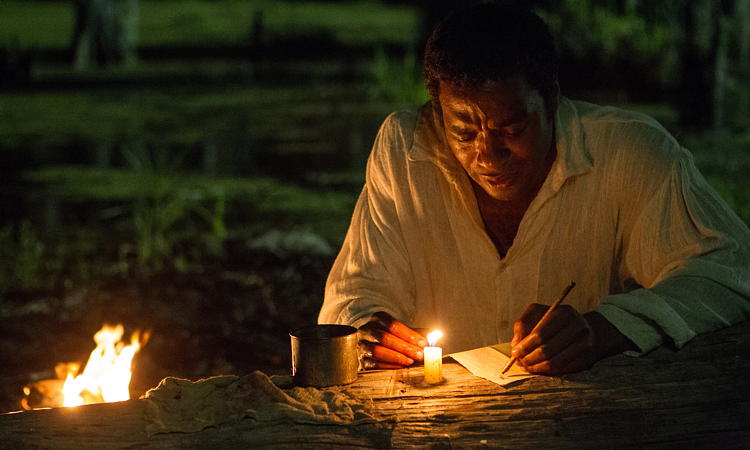
6. 12 Years a Slave
Steve McQueen's masterful depiction of slavery is one of the most harrowing and brutal representations of racism ever recorded on film. When it premiered at TIFF, several people fainted during some of the more horrific scenes of human degradation, much like how many people still, to this day, have trouble finishing Schindler's List. And in a way, that's an apt comparison — 12 Years a Slave is the Schindler's List of slavery movies. It strips down all the false drama and pretense imaginable, and just tells a truly heartbreaking story about a good, free black man (Chiwetel Ejiofor, in possibly the best male performance of the year) being abducted and sold into slavery in the South. It's a hard story to hear, much like how it's a hard movie to watch, but the rewards upon completion are immense.
During Solomon's 12 years of imprisonment, he is on two plantations — one run by a decent human being (Benedict Cumberbatch) and another by a hideous tyrant (Michael Fassbender), whose wife is almost as evil as he is. Whenever I assumed the movie would start getting almost cartoony in its attempt at button-pushing the audience, McQueen restrains himself, standing back, letting the horrors of racism sit casually in front of us, daring us to look away. Single-take shots like Ejiofor's failed hanging or when he finally breaks down during a funeral are amazing in their simplicity and power. The film will probably win the Best Picture Oscar; obviously I feel a couple other films deserve the distinction more, but it would still mark the best movie to get the top honor in years.

5. The Wolf of Wall Street
Every time a new Martin Scorsese film comes out, the greatest compliment that can be given is if it's as good as his classics, of which the man has many (Raging Bull, Taxi Driver, Goodfellas, etc). And the surprising thing is that this 3 hour black comedy with the most f-words of any film in history actually does manage to compare to those films. It's as good as The Departed, which many proclaimed his "comeback" in 2006, and in fact it may even be the stronger of the two films. Wall Street is a rarity for Scorsese in the sense that it's a comedy with almost no violence, but it's perfectly Scorsese-ish in the passion, exuberance, and endlessly entertaining filmmaking.
Leonardo DiCaprio is terrifically slimy as Jordan Belfort, the "Wolf" of the title that winds up making almost a million a year by ripping off everyone around him, and who also does more drugs and hookers on a daily basis than most human beings have in their lifetimes. His partner in crime is Jonah Hill, who is surprisingly excellent and smarmy. Because it's Scorsese, you can expect a wildly enjoyable romp, with amazing camera work, frantic editing, a great rock-song soundtrack, and a screenplay filled with quotable dialogue and horrible characters. The movie is divisive because of its shockingly bad language, copious drug content, and more sex/nudity than any other movie besides Blue is the Warmest Color. But it's a film about excess, so it had to be excessive too, and in the process we got another Martin Scorsese masterpiece.

4. Prisoners
Denis Lauvenrent exploded on the indie scene a few years ago with Incendies, one of the most successful Canadian films of the decade. Personally, I was thoroughly unimpressed by that flick, even falling asleep briefly while watching it in theatres. So when Prisoners came out, I didn't exactly rush out to see his latest, fearing something as stagnant and dull as Incendies. I couldn't have been more wrong. Prisoners is one of the most accomplished suspense/dramas in years, weaving a complex tapestry of moral dilemmas, extreme tension, and beautifully flawed and realized characters that actually get to have conversations about more than just the mechanics of the plot. It's a film Hitchcock not only would've been proud of, but probably would've made himself, and not done much better.
Hugh Jackman and Jake Gyllenhall give the best performances in their careers, in a story about a stern father (Jackman) who's little daughter is kidnapped, and begins his own torturous manhunt while the cops (led by Gylennhall) do their best. The decisions and actions performed by Jackman could easily count him as the villain, and yet the movie never stoops to such basic levels, and continually engages us in asking our own questions, such as "how far would I go, in their shoes?" But in case I'm making the film sound too intellectual, rest assured it's also a terrific suspense thriller, with a plot that consistently kept me guessing and a deliciously ambiguous ending. Prisoners is one of the most assured and confident pictures of the year, never resorting to cheap tricks in order to entertain, disturb, and provoke us.

3. Upstream Color
Shane Carruth's long-awaited follow-up to his Sundance hit Primer is among the more audacious and bizarre films of recent years. It's also among the most brilliant — despite the experimental nature and confusing narrative, Upstream Color rewards viewers with patience, and manages to get even better the more times you see it. There's literally a wealth of treasures here, from Carruth's supple direction, jagged editing, the excellent acting (Carruth himself plays the male lead), the mysterious science fiction storyline, and the sound/music design that rival's Gravity for its depth and ingenuity. Upstream Color is probably the most abstract and obtuse film on this list, but it's not just for film students — I finally convinced my fiancé to watch it, and despite her general dislike of the avant-garde, she was very intrigued and impressed throughout.
The film opens with a man taking little bugs off of some plants he nurtures, ones that make the person who eats them under a hypnotic control, which this man (never named) uses to rob people blind. We see him take control of a young woman, who after a few days is now penniless, and saved only by a mysterious pig farmer who extracts the drug and places it into a pig. Where the story goes from there, I'll leave for you to discover, but suffice it to say that being able to create such a bizarre, emotional, and even romantic sci-fi story for such a low budget is hard proof that Carruth is a real filmmaker, not a flash-in-the-pan.

2. Gravity
Seeing Gravity in the huge IMAX 3D screen is one of the ten greatest movie-going experiences of my life. It ranks up there with seeing Vertigo on the big screen, and Polar Express (damn rights), and The Fountain, and Avatar for the first time. It's an immersive, involving, engaging film like so few are; visually, it's perfect, with every frame supporting countless detail and every movement eye-popping. It's a surreal adventure, one where 90 minutes move breathlessly by, consistently filled with action, suspense, drama, and a beautiful visual poetry. At a time where most movies are cardboard cut-outs of previous ones, Gravity is a breath of fresh air — I've never before seen a film quite like it, and doubtfully will again.
Sandra Bullock and George Clooney star (her giving the performance of her lifetime, him playing…George Clooney), as two astronauts who are plunged into a nightmare of danger when a revolving storm destroys their shuttle and they have to find a way to survive while floating above Earth. This simple premise showcases that sometimes you don't need an overly complicated plot or huge depth of characters to create an extremely visceral experience, and Gravity is literally 90 minutes of white-knuckle suspense. The musical score by Steven Price amplifies the terror (and eventual beauty) without condescending to it, and because of the zero sound effects in space, it often plays almost like enhanced musical noise. And the special effects are, obviously, among the top 5 greatest examples of CGI I've ever seen — in the IMAX theatre, Gravity was often more impressive than Avatar.
I adored Gravity, although I'm nervous about seeing it on a small screen. No matter — the visual complexity and impressive cinematography of Alfonso Cauron's film cannot be touched by any other film this year. In fact, he manages to even top his great Children of Men for sheer moviemaking (his confidence is so large, most of the takes in the film run upwards of 10 minutes long). Gravity is a truly brilliant film.
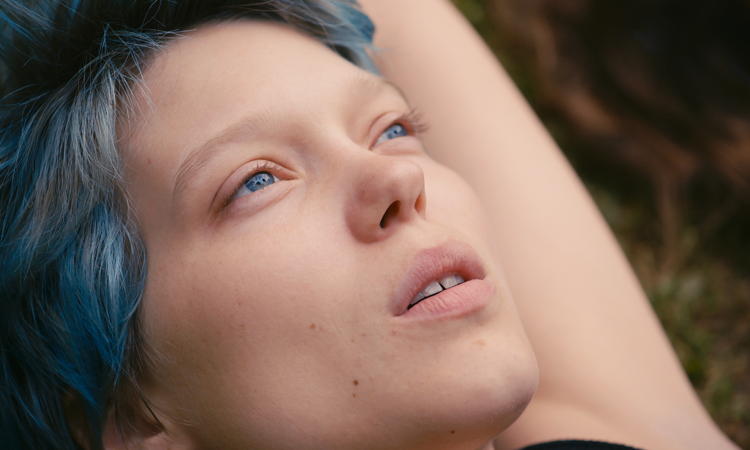
1. Blue Is the Warmest Color
I see a lot of movies, and a lot of sad, disturbing, tragic dramas, and rarely do any of them actually affect my mood anymore. Blue is the Warmest Color hurt me in ways that few films ever have. When the two lovers fought, I felt pain. When they broke up, I felt heartbreak. When the film finally ended, 3 hours later, I just stared out the window for a good 30 minutes, contemplating my life. It made me happy and grateful to have found my lovely fiance, but it worried me that if I lost her someday, what the hell would I do? Ultimately, Blue is a film for the ages, a remarkable, epic love story that spans almost a decade. The lead character, played in the year's best performance by Adele Exarchopoulos, is someone I cared more about than any other fictional character in years. I so desperately wanted to see more of her life, see where she went, what she did, her happiness, her loves. But then the movie ended, and it threw me into a really surprising, bizarre melancholia.
So that was the immediate visceral reaction; let me try and explain the actual movie a bit more, lest this is all a little too abstract and emotional. Blue is the Warmest Color follows Adele, as she grows from a 15 year old student to a mid 20's teacher. Specifically, it focuses on her love life; how she was bored with her boyfriends, then fell in love with Emma, a blue-haired lesbian (played wonderfully by Lea Seydoux), and the rest of the movie follows the rise and fall of this relationship. The film is long, but doesn't feel a minute "too" long; we're finally allowed some depth in our characters, and they're given room to breathe, and the dialogue (much of it adlibbed) feels spontaneous, real, authentic. The direction by Abdellatif Kechiche begins as slightly distracting, what with its endlessly handheld close-up's, but it gives the film an immediacy and intimacy it would've otherwise lacked. And there are scenes in the film that are so perfect, I almost couldn't believe it; even a small instance, such as when Adele finally talks to Emma, and she leans in close to hear her words, and Adele's breath is literally taken away for a split second….it just blew me away, how perfectly that moment was captured.
I've gone two paragraphs without mentioning the main gripe people have with the film; it's already-legendary lesbian sex scenes, which are as graphic (and long, sometimes reaching 10 minutes) as any soft-core porn. For me, there was a purpose for it; it's eventually revealed that Emma's primary attraction with Adele is only sexual, so we do need to see the depth and power of their lovemaking to understand the later break-up. People say it's lesbian love "directed by a straight man", but for the sole purposes of this article (honestly!) I looked up some lesbian porn directed by women, and…sure didn't seem any different to me. But the controversy around these scenes are distracting everyone from the rest of the film. Ultimately, Blue is the Warmest Color is an incredibly powerful, moving experience, one that "got" to me in a way that rarely happens. If you have any preconceived notions of what a "3 hour French lesbian drama" can be, throw them away, because Blue will surpass them all.